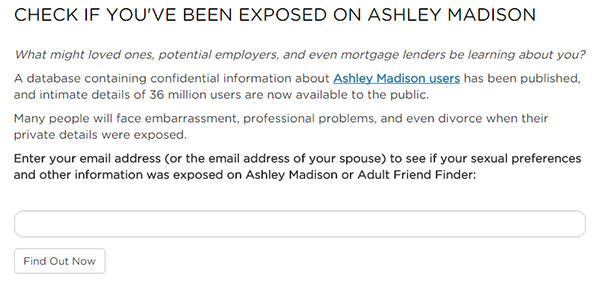The recent news regarding the publishing of a 10GB data dump extracted from the Ashley Madison servers will likely be the cause of a few sleepless nights for a lot of people across the globe. The database containing confidential information regarding approximately 37 million Ashley Madison users, is now freely available to anyone wishing to peruse the information, which contains not only personally identifying aspects but also personal preferences that can cause some serious embarrassment to users. While the information can’t be removed from the public domain but a new tool can at least let you check if your details, or those of your spouse, form part of the data dump.
It stands to reason that there is going to be a lot of nervous individuals around the world. The very nature of the Ashley Madison service means that the majority of users in the database leak were likely looking for some sort of extra-marital activities. With an estimated 37 million accounts comprised as part of the hack it undoubtedly means that there is going to be a great deal of backlash when partners or loved ones learn that their loved ones were members of the controversial site.

It’s possible to check if you’re on the leaked list by obtaining the raw data dump and sifting through the information for yourself. Alternatively, you could use a handy little tool created by private investigation firm Trustify. Simply point your Web browser to trustify.info/check. The aptly named “Check if you’ve been exposed on Ashley Madison” tool provides an extremely simple mechanism for nervous individuals where they can enter an email address to see if it’s part of the database that was dumped online by the hackers. Users are able to enter their own email address or one that their spouse might use to see if it was associated with an account on the Ashley Madison website.

As you’d expect, the tool is extremely simple to use. Simply enter an email address and select “Find Out Now”. The service then lets you know if that provided email address has been compromised or not. The firm is also keen to point out that all of the indexed information that it searches was collected from third-parties. It’s essentially saying “we had no part in this data breach, but we are making it easy for you to see if you’ve been compromised”.
You can follow us on Twitter, add us to your circle on Google+ or like our Facebook page to keep yourself updated on all the latest from Microsoft, Google, Apple and the web.

